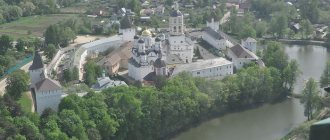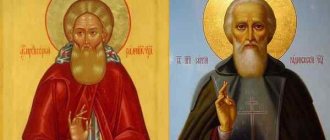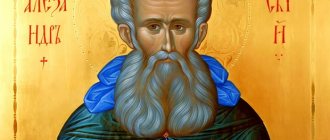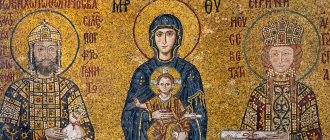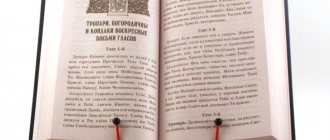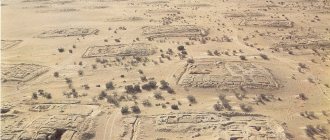Life of a Saint
When Batu Khan conquered the Russian land, devastating it with sword and fire, the great-grandfather of Paphnutius Borovsky came here along with his army. And he stayed here as a baskak, a Tatar official who collected taxes from the Russian people. This type of occupation was characteristic of the great-grandfather, and then the grandfather of the future saint.
The last of them, during the uprising of the Russian people against the Tatars, was baptized into the Orthodox faith. And already the father and mother of Paphnutius Borovsky were distinguished by many Christian virtues, strong faith and piety. They raised their son Parthenius (the name given at baptism) as befits Orthodox Christians.
Wonderworker Paphnutius Borovsky
The youth Parthenius grew and improved not only physically, but also assimilated spiritual truths, which were firmly instilled into the fertile soil of his soul. He excelled in literacy, especially in reading the Divine Scripture. The boy grew up meek, kind, chaste, and avoided empty talk and unnecessary communication.
When he turned 20, he left home, parents, friends and entered a monastery, renouncing his love for the world. And Parthenius’s siblings, of whom there were three in the family, also chose the monastic path for themselves. Their pious parents accepted this decision as the mercy of God, despite the fact that this interrupted their lineage, since celibacy was prescribed for monks.
The Vysoko-Pokrovskaya monastery, which Parfeniy chose for his exploits, was located not far from the place where he was born and raised (the village of Kudinovo, later the city of Borovsk). Here the young novice soon took monastic vows with the name Paphnutius.
Interesting! The abbot of the monastery gave the young monk under obedience to Elder Nikita, who at one time was under obedience to the Venerable Sergius of Radonezh himself. Thus, the newly tonsured monk embarked on the spiritual path laid out long before him by the “abbot of the Russian land.”
Paphnutius learned many monastic virtues from Elder Nikita. He won everyone's respect and love. When Abbot Markellus passed away, the brethren of the monastery unanimously elected Paphnutius in his place. All-Russian Metropolitan St. Photius was ordained to the rank of abbot and received his blessing for the position. The new abbot set a good example for the brethren of the monastery and cared for each of the souls entrusted to him.
As abbot of the monastery, the Monk Paphnutius worked harder than anyone else. He spent the whole day in monastic labors, and at night he prayed. And the Lord rewarded his faithful servant with many spiritual gifts:
- wondrous revelations;
- prophetic dreams;
- prudence;
- insight;
- healings of the sick and suffering;
- the ability to read his passions on a person’s face;
- other gifts of the Holy Spirit.
More than ten years passed like this. The monk, as an experienced doctor, healed the illnesses and infirmities of those of his brethren who stood in the path of sin. Like a good shepherd, he plucked the sheep from the wolf's mouth and carried it home to the kingdom of heaven on his shoulders.
Construction of the monastery
He labored as an ascetic at the Intercession Monastery for about thirty years, of which thirteen years as hegumen. At the age of 45 he became seriously ill. And, preparing for his death, he accepted the Great Schema. But, as often happens in spiritual life, he unexpectedly recovered. For Paphnutius this became a sign from above.
He abandoned the abbess and went in search of a quiet, secluded place. And he found it not far from the former monastery, on the opposite bank of the Protva River, only four kilometers away. As more and more brothers joined him, he founded a monastery here in honor of the Nativity of the Blessed Virgin Mary.
The new monastery began to grow quickly. Thanks to the authority of Saint Paphnutius, the monastery became one of the largest among other such communities. There were 95 brethren. The date of foundation of the monastery, which the reverend himself. Paphnutius called the house of the Blessed Virgin Mary, the year 1444 is considered.
St. Pafnutiev Borovsky Monastery in the Kaluga region
It was then that the construction of a wooden church in honor of the Nativity of the Blessed Virgin Mary began. And then, only thirty years later, a temple appears in the same place, made of white stone and also named in honor of the Mother of God.
The Pafnutievo-Borovsky Monastery, of course, performed the functions of a spiritual monastery. Of course it was also a defensive structure. The monastery was rebuilt many times, but retained all the seriousness and severity inherent in ancient Russian buildings. At first, all the monastery buildings and fences were wooden. Monolithic high walls, which turned the monastery into a harsh border fortress, the appearance of which has been preserved to this day, appeared only at the end of the 16th century.
The famous architect Fyodor Kon, known for his buildings in the Kremlin, worked here. The monastery turned into a fortress due to the fact that it was located in a strategically important place on the outskirts of Moscow and on the outskirts of the principality. The monastery was surrounded not only by walls, but also by towers:
- Round (16th century) is the oldest;
- Georgievskaya (17th century), through which the entrance to the monastery used to be carried out;
- Armory - where weapons stocks were stored;
- The guardhouse was the highest; the guards were located on it;
- Treason—through which the invaders may have entered;
- Cookroom - where the cookhouse was located.
In the 17th century, another gate was broken between the kitchen tower and the St. George tower. Previously, they were called the Breachers, now they are called the Saints, because it is through them that the only entrance to the monastery is made.
Cathedral of the Nativity of the Virgin Mary in the Pafnutiev-Borovsky Monastery
In the most beautiful architectural ensemble of the monastery, its main temple stands out - the Cathedral of the Nativity of the Blessed Virgin Mary, where the shrine with the relics of St. Paphnutius is located. The tallest building of the monastery, its architectural dominant is a five-tiered bell tower, on the walls of which unique tiles made by the master Stepan, nicknamed Polubes, have been preserved.
The exploits and personality of the saint
The glory of the exploits of St. spread far away. Paphnutia, attracting more and more lovers of piety to the new monastery. The monk was a strict faster, choosing the worst for himself: food, clothing, other things necessary for life, comforts. His robe and shoes would have been suitable only for the last beggar - they were in such a wretched state.
He was the first to come to obedience and prayer. I chose the hardest job for myself:
- worked the land;
- looked after the garden;
- chopped and carried firewood;
- performed other obediences.
In winter, when there was less work, he devoted a lot of time to reading and weaving fishing tackle. The monk never allowed anyone to touch his body, so strictly did he observe the rules of chastity. He did not allow women into his monastery at all under any pretext. He forbade the rest of the monks to talk about them.
Venerable Paphnutius Borovsky
Laymen, simple and noble people came to him from everywhere, as to a skilled healer, and he received everyone with joy, conducted instructive conversations, consoled, and instructed. The ascetic was impartial and did not fear the powers that be. He was kind and affectionate with humble people, but he did not favor proud people.
He was also merciful and loved to take care of the poor. He fed the poor in days of famine, often a thousand people a day, thereby depleting the monastery’s reserves. But the Lord, seeing such God-loving generosity, sent earthly gifts to multiply many times over the next year.
Miracles of the Saint
The Monk Paphnutius was amazingly patient in everyday needs and never lost hope in God’s help. One day, on the eve of Easter, there was absolutely no fish in the monastery. The brethren were saddened and grumbled. But Saint Paphnutius urged them not to anger the Lord and not to be sad - everything will work out with the help of God.
This hope of the venerable ascetic bore fruit. In the evening, on the eve of the great holiday, one of the monks noticed that the water in the river had overflowed and a huge amount of good fish had gathered near the shore. Saint Paphnutius glorified the All-Merciful God and blessed him to cast the fishing nets. The catch exceeded all expectations. There was enough fish for the entire Bright Week, give twice a day.
Another case that eloquently testifies to the holiness of Abbot Paphnutius. The monk forbade the icon painters working at the monastery from eating meat on the territory of the monastery. At first they observed this rule, but then, yielding to temptation, they brought part of the boiled lamb carcass to the monastery.
Icon of Saint Paphnutius of Borovsky
The first to try the food was an icon painter named Dionysius. But inside he found a lot of worms and was forced to throw everything to the dogs. Moreover, the man soon became covered with scabs. He brought repentance to the abbot, and he, having gathered the brethren of the monastery, held a cathedral prayer service. He washed the body of the sufferer with holy water and the scabs fell off his body by themselves.
The monastery was surrounded by a dense forest, in which there were many different animals and birds. There were also a lot of ravens. They nested near the very walls of the monastery, and the abbot often watched them from his window. The Monk Paphnutius forbade the catching and killing of these birds.
One day, one of the hunters, driving past the monastery, saw a flock of flying ravens and, drawing his bow, killed one bird. But then he noticed that his head, turned towards the flying raven, could not turn to its normal, natural position.
Repentance gripped the unlucky hunter and he went to the monk to ask for forgiveness for violating his covenant. All the monks of the monastery were convened again, and a prayer service was served. The young man, overshadowed by the holy cross in the hands of the Monk Paphnutius, was healed.
Death of a Saint
The Monk Paphnutius lived to a ripe old age. Only when he was 83 years old, the Lord announced the old man’s imminent death within a week. This happened shortly after the Easter holidays, in the spring of April 6, 1477. The saint spent all the remaining days of his life in prayer, allowing only the brethren of the monastery to see him. He refused to meet the laity, including the most noble and rich of them, sending back their gifts.
As the Lord predicted, the venerable elder rested a week later, having during this time managed to receive communion several times and attend the liturgy several times. The brother monks helped the saint to endure the service, supporting him by the arms. The monk died on May 1, 1477, at about seven o'clock in the evening, an hour before sunset.
Saint Reverend Paphnutius Borovsky
Saint Paphnutius commanded that he be buried only in the presence of the monks of his native monastery. But since this happened late in the evening, the burial was postponed until 5 am the next day. As soon as the funeral took place, news of the saint’s death leaked through the gates of the monastery and crowds of lay people began to flock here, wanting to say goodbye to their beloved priest.
Canon to the Holy Venerable Paphnutius of Borovsky
Song a҃.
Irmos:
We will sing the victory song to all the gods, create a marvelous human being with a tall muscle, and save them, and become famous.
Now I will bring you a song and a prayer service, in the eternal world, my dear God, grant me grace with your prayers, so that I may sing to you. ̀.
I am enslaved by the passions of darkness, by your holy prayers, blessedly, now freedom: yes, this is your slave I will sing with great songs, I will become famous.
Christ adheres to youth, blessedness, purified, cleanliness and whole body health enlightened Yes, I am fleshless on earth after living. And now we stand in the highest gods, remember us.
Bgorodichen:
It was born and buried, and the dead are imperishable, two hours ago. Please, please save us, please save us.
Song of the city.
Irmos:
May my heart be established in your will, blessed as it is, and above the waters the sky is second, and again on the waters of the earth, omnipotent .
Bzhⷭ҇tvennoy light, bg҃omꙋ́dre, enlighten, ѻ҆́ch҃e, most beloved: your bright and luminous and honest ᲂ success of any Oh dear God, with your prayers I will enlighten you.
Ou҆ma yours ѻ҆́ko, prpⷣbne ѻ҆́ch҃e, ѿ the passions of the darkness ѡ҆pure, prest҃оmꙋ dh҃ꙋ with a very pure sparkle sodѣlal є You are blessed.
With firmness of mind, strength, all-blessedness, different dreams of the enemy exposed him, mother, and the pride of those exalted I deposed him, Reverend.
Bgorodichen:
And before everything is born, and after the indescribable and from your birth will pass, and God our nature, and so on Oh, the faces of such saints are gone.
Sedalen, voice and:
Ѿ youth, bliss, everything is in the world of life, red and sweet, ᲂу҆рѣднѡ has followed є҆сѝ хрⷭ҇тꙋ̀, call voshemꙋ tѧ̀, prpⷣbne. Let us continue, oh, and always in our prayers, incessantly vigil: even so, where goodness is building for the future styrѧ your ѻ҆вцсвьє́смєшмі, пофнꙋ́тїе бг҃оно́се, млѝ хрⷭ҇та̀ bг҃а, зргѣхѡ́вь ѡ҆стснї prescribed servings honorꙋ́́s loving saint I appreciate your memory.
Glory, and now:
Ꙗ҆́кѡ dv҃ꙋ и҆ є҆ди́нꙋ in wives, that is, without the seed of birth of flesh, all the blessed birth of humanity: ѻ҆́gn Because everything is in this world, and you feed the milk of the creators and the city. Thus, the Aggul and human race, we worthy glorify your blessed joy, and we agree with you: pray for the blessing of God , the sinner has been given the gift of worship to those who worship with faith by your Lord.
Song of the day.
Irmos:
The Spirit of Providence, in other words, the word incarnate, preached his words: you will always come close, you will know: you will always come to belt, show yourself. Glory to your strength, where.
The law of life preserves the integrity, integrity, purity and humbleness of you from infancy, and your life is not bad, and your morals are good ostiven, ven.
He raised his heartfelt desires, and humbled his spiritual passions, and laid down his heartfelt passions, monastics are immovable.
In poverty, having lived in bliss, he became rich in virtues, and lived in holiness, he was fulfilled, and passed away to the highest city. ꙋ, ѻ҆́ч҃е пофнꙋ́тїе, и҆ мішыѧ и҆збавстисиѧ ѿ ѿ ѿ ѿ ѿ ѿ ѿ зсд ꙋ ꙋ̀.
Bgorodichen:
The story, more than meaning and nature, gave birth to it, btsⷣe, ѡ҆svѧѧchenї and іsparedment, ѣѡѡѡѡіstavlіnї sins, ѣѣ By your earnest intercession, on this glorious Sunday.
Song є҃.
Irmos:
Give us your peace, dear one: and we don’t know about you, and we know your name, we are alive and well rtykh є҆сѝ.
The Holy Father was a nourisher for widows, mourners, a beloved helper, a shepherd and a mentor to your flock, a teacher about this: and now diligent prayers are with us.
And the truth was true, the spaciousness of the distance, the close preference, reached the latitude of paradise, and the tree of life You say: but also remember us by faith.
Having found your heart, the tablet is pure, the blessing of the soul of God, God, God, has granted you complete dispassion, faith. firm and love is impersonal.
Bgorodichen:
The holy day of the world is filled with joy, marie, with the desecrated sweetness of my soul, and the holy glory I created a partaker.
Song of ѕ҃.
Irmos:
I imitate, cry out: my life, better, freedom from the world, and the glory of the world, the glory of the world, the call: glory to you.
With fear we have confirmed everything, like the body and dꙋ́shꙋ, and we have cleaned everything, and all the filthiness, and The dawn will be trisolar, blessed and blessed.
The whole world is scattered, blessed, and the same thing is similar ѧ, the participant was є҆сѝ resurrection and ҆ glory of the best, in it remember us.
The temple is all the faithful stgagi dha vema. The temple was successfully erected by her, and also by her birth name, and by the city, and by the monks. I drank a lot of scoops. and now with your prayers every week I am driven away.
Bgorodichen:
Having seen that she gave birth to her god, and raised the dead, she was filled with joy, both of us. That's why we pray, all the sadness in our hearts will be consumed to the end.
Kontakion, voice i҃.
We are enlightened by the light of God, our lenten life, holy saint, our kind mentor, and the good of fasters is more beautiful. nope. Nowadays, for the sake of your success, you have seen so many gifts of wealth that you have healed. We are happy to cry out to you: we are glad, we are happy.
Ikos:
The song is from the walls of the bad, to the praise of your achievements, well, it is brought, not to my mother, for my heart is pure, for all that with shameful children of filthiness, and with the best thoughts of filthiness. but give me your word, O Reverend, your pure praise of life, calling upon you like this, most blessed: glad, praise of all likewise: glad ꙋsey, fasting to the imitator, and shame to the planter: glad, ꙗ҆́кѡ in it, the most honorable temple of the btsⷣi has erected є҆сѝ: ꙋ, ꙗ҆ what's in it God is glorified by you: glad, good shepherd of your flock and bringing down enemies: glad, you humbled your first enemy ̀: gladly, ꙗ҆́кѡ has put to shame the є҆сѝ besѡ́v regiments: ́дꙋyѧѧ, monasticsꙋthe Most Holy Most Holy One, and ҆ pillar of patience: ́ Let us gather many monks for salvation: I’m glad, and I don’t praise everything: I’m glad, I’m glad, for the sake of getting rid of troubles: I’m glad, I’m glad that is.
Song z҃.
Irmos:
With the one in the cave, yours, please, don’t touch, lower level. then three, ꙗ҆́кѡ є҆ди́нѣMI ᲂу҆стр поѧ́хꙋ и҆ BLESS ꙋ, saying: Blessed be the God of ours.
Let's look at life, blessedly, the world is dead and truly, the sun has risen. We took the fear of God into your heart, the universe made you happy with all your hearts, and cried out: blessed be the God of ours.
From the perspective of the mental world, and the pain of the heart is removed, the pure life of the elderly, blessed, and k the ageless food has ceased: in the same way remember us.
Having decorated your life with virtues, you will end your life. I hope you, Reverend, my son is peaceful. Also, always save your flock, your memory of those who celebrate and cry: blessed be the God of ours.
Bgorodichen:
The excellence of ѵ҆postaїyu and ц word існішні, a doctor for sham and ҆ tѣ́lѡm generation, ꙗ҆́ ulcers and ҆ purulent ꙋнїѧ for my ѧ̀ ᲂу҆вЂѧ Yes, fierce and painful, my heart has healed, two.
Song and.
Irmos:
Just as we are afraid, and all the ministries, the Creator and where we are, sing, O priests, glorify, Holy Trinity, bless, people, and exalt them to all ages.
Struggle everything on earth according to the law, now we are happy, reverend, with the ranks, we will have peace, and our partner will be happy. Oh and joy, we cry: people, exalt where you are forever.
Let us continue to cleanse the earth, the meek and the gentle, who live in the land of the meek, God, with all the righteous and the chosen ones: people Yes, exalt the place forever.
I have fulfilled my passion for my prayers for God with sacred prayers: and containing my sins, captivity and deliverance , I love you, let me gladly sing: people, exalt you forever.
Bgorodichen:
Have mercy on us who sing yours, where are the two ineffable rhymes, and from the passionate troubles and sorrows of your servant, with the prayers of the Lord You are your dear, merciful and loving member.
Song ѳ҃.
Irmos:
The life-giving source of ever-flowing light, the luminous lamp of grace, the temple of God, the world of all things, the earth is spacious We magnify you, bcⷣꙋ.
The sun has risen, your memory, likewise, enlightens the hearts of the faithful, and drives us further We praise these passions, now committing piety, with joyful songs.
Let us anoint you in heaven, abstinence has flourished, and our anointing oil has spread to our faces and hearts. Let us cherish your blessings, in honor of your sacred memory.
Today, we appreciate your honest memory, most blessed woman, enlightening our souls and bodies, and the passions of the darkness, persecuting, reverend, prayers. Voѧ̑, pafnꙋ́tїe ѻ҆́ch҃e, and instruct on the path of life. We are even more worthy that we magnify you even more.
Bgorodichen:
Accept, first of all, the blessed song, giving grace to those who hope, and the world and ask the churches for gifts, and all It magnifies the Christian language.
Luminous:
The holy city created the most beautiful images, it is more beautiful, more beautiful than ever, and it has accomplished everything. This is a mental paradise, bringing unique, unique and multiform colors, worthy of those who create your memory.
Glory, and now:
You are merciful and your mercy is great, look down, pray for the two, on my humility, and the passions of the darkness, and the temptation of life destroy the Holy Trinity, and deliver the Gehensk with your prayers.
How does prayer to a saint help?
Prayers are offered to the saint for the granting of piety and strong faith, mental and physical health. He helps those who pray to lead a godly, quiet life, receive forgiveness and remission of sins, and be honored with a good Christian death and heavenly bliss.
They pray to Saint Paphnutius for peace and prosperity in their native Fatherland. He helps believing spouses find the long-awaited happiness of having their own children. There is an opinion that thanks to the prayers of the Monk Paphnutius, Tsar Ivan the Terrible was conceived and born.
